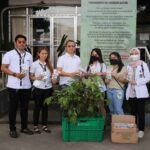Negros Oriental, Negros Occidental and Aklan, all in Western Visayas, announced bans on the entry of pigs and pork products from Cebu, after pigs in a slaughterhouse in Carcar City tested positive for ASF on March 1, 2023.
But local pork producers don’t expect the bans to have a big impact on Cebu’s P11 billion hog industry.
The mere announcement of the ASF outbreak in Carcar last Monday, however, has already hit pork sellers in Carcar City.
Meat and lechon vendors said sales had slowed down at the public market, and fewer orders had come in since the announcement of the ASF outbreak in Carcar.
Rubi Alcordo, a pork vendor in the city’s public market, told SunStar Cebu on Saturday, March 11, that their sales had declined in just a week as many people opted not to buy pork meat and byproducts, fearing these are contaminated.
ASF is not a threat to human health, but it is fatal to pigs.
Before ASF was detected in Carcar, Alcordo could sell meat from six hogs daily. This has now dropped to only two hogs.
“Mag daghan mi og ihaw, unya di gihapon mahurot. Maong nag menor na lang usab mi sa among ihaw,” Alcordo said. (Even if we slaughter several hogs, we would not be able to sell all of them so we had to cut down.)
Rutchelle Largo, a lechon vendor in the same public market, said that before the outbreak, they could deliver at least five whole lechon (roasted pigs) to customers in Cebu City, especially on weekends.
On weekdays, they could sell three to four whole lechon at their own stalls in the market. These days, lechon vendors said they could barely sell two whole lechon in a day.
Largo and her fellow lechon vendors were also affected by the ban on the transport and sale of pork products, such as lechon, outside of Carcar City. They did not receive a single order for a whole lechon this week, she said.
A small lechon that weighs 15 to 16 kilograms is currently sold for P6,500 to P7,000, while a kilo of lechon is sold for P700 to P800.
Bohol first
Through Executive Order (EO) 11 issued last March 7, Bohol Gov. Erico Aristotle Aumentado was the first to announce a ban on the entry to Bohol of live pigs, pork, pork products, swine feeds and frozen semen from Cebu Province and Cebu City.
On the same day, Negros Occidental Gov. Eugenio Jose Lacson and Bacolod City Mayor Alfredo Abelardo Benitez signed Joint EO 1 imposing a ban on the entry of live pigs, boar semen, pork, pork products and other pork-related food items from the Province of Cebu, the Camotes Islands and Bantayan Island to protect Negros Occidental’s P6 billion hog industry.
The joint EO also bans the same items from Panay and Guimaras Islands, Eastern Visayas, Luzon, Mindanao and ASF-affected countries.
Processed pork products like canned goods and fully cooked pork chicharon (cracklings) are excluded from this ban.
On March 8, Aklan Gov. Jose Erique Miraflores issued EO 21 imposing a ban on pork from all provinces in the country with reported ASF cases. The ban applies to swine, pork products, pork-based or any products mixed/commingled with pork-based products whether raw or processed, and those that cannot be ascertained including semen, non-pork processed or cooked products unregistered with the Food and Drug Administration, according to the Philippine Information Agency.
Then on Thursday, March 9, it was learned that Negros Oriental had also banned the entry of pigs, pork and byproducts from Cebu province.
The ban, which is for 45 days, is based on an executive order that the late Gov. Roel Degamo signed on March 3, the Philippine News Agency reported.
Degamo and eight other people were killed in his house on March 4.
Intra-Cebu bans
These bans add to the ones imposed by local government units (LGUs) within Cebu itself against selected Cebu areas.
The Province of Cebu, and the independent cities of Cebu, Mandaue and Lapu-Lapu imposed bans against Carcar City when the ASF infection there came to light.
Mandaue’s ban extends to Carcar’s four adjacent towns of San Fernando, Sibonga, Barili and Aloguinsan in the buffer zone.
In Cebu City’s case, the ban on live hogs, pork products and byproducts covers 17 of Cebu Island’s 53 LGUs: Carcar City; San Fernando, Sibonga, Barili and Aloguinsan; City of Naga, Argao, Pinamungajan, Dumanjug; Minglanilla, Dalaguete, Toledo City, Ronda, Alcantara, Moalboal and Badian; and Talisay City.
Negros pork banned
Cebu Province, Danao City and Lapu-Lapu City have also imposed bans on the entry of live hogs, boar semen, pork and pork-related products from Negros Island, after the Department of Agriculture in Central Visayas said the pigs that tested positive in Carcar City originally came from Negros Island.
The Negros Occidental provincial government has asked for reconsideration of the ban imposed by the Cebu provincial government on its pork products, saying that Negros Occidental is still free from ASF.
“Unless and until the Department of Agriculture issues a certification that Negros Occidental is ASF-infected, there is no reason for the impairment or restriction of transportation of basic goods such as pork, as these are food products. This is a legal violation,” SunStar Bacolod reported Provincial Administrator Rayfrando Diaz II as saying last Tuesday, March 7.
Safe to eat
In southern Cebu, Dr. Ma. Felmar Deza, head of the Carcar City Health Office, assured the public that the pork meat and lechon sold in the public market are safe to eat.
Deza said the City Health has intensified its surveillance of pork meat and byproducts sold in the public market, including those from in-house and illegal slaughterhouses.
Vendors of pork meat and lechon have to secure a Meat Inspection Certificate issued by the city veterinarian before they can sell their products to the public. Otherwise, these will be confiscated and disposed of accordingly.
“We are seeing to it that no one slaughters hogs in their backyards. That would be considered hot meat. It’s considered illegal and we would confiscate and dispose of them right away,” Deza said.
Minimal impact
Though other provinces outside Cebu announced a ban on the entry of live hogs, pork products and byproducts, this will have a minimal impact on the hog industry in Cebu, a pork producer said.
Central Visayas Pork Producers Cooperative (CeViPPCo) president Jonathan Young told SunStar Cebu Saturday that Cebu pork producers don’t normally sell live hogs and pork meat to other provinces.
Rather, Cebu exports processed pork meat products like ham, sausage and hotdogs to other regions.
National Meat Inspection Service (NMIS) Regional Director Alvin Leal told SunStar Cebu Thursday that only AA-grade and AAA-grade slaughterhouses accredited by the agency in Cebu are allowed to sell their meat to the rest of the country.
Of 56 slaughterhouses in Cebu, only four are NMIS accredited.
Data from NMIS showed that in February, Cebu province, including the highly urbanized cities, slaughtered 41,430 live pigs, producing 2.6 million kilograms of pork meat.



